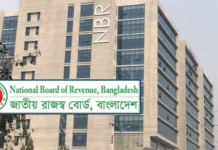The Daily Star

Listed banks in Bangladesh posted higher profit in the January to September period on the back of higher income from their investment in the stock market, a pick-up in credit demand and lower expenses.
The lenders made a combined profit of Tk 6,923 crore during the nine-month period, up 29.88 per cent from Tk 5,330 crore a year ago.
Of the 32 listed banks, 26 clocked higher profits, five made lower profits, and one incurred losses.
Among the banks, Pubali Bank made the highest profit of Tk 464 crore. ICB Islamic Bank incurred loss of Tk 31 crore.
“Listed banks logged higher profits in the current year on the back of their investment in the stock market,” said Ali Reza Iftekhar, chairman of the zAssociation of Bankers, Bangladesh, a forum of the chief executives of lenders.
As the key index of the stock market surged, banks did not have to set aside any provision, which had a positive impact on the overall profits.
The DSEX, the benchmark index of the Dhaka Stock Exchange, advanced 1,711 points, or 30 per cent, to 7,329 during the nine-month period. It had risen 510 points, or 11 per cent, in the same period in 2020, DSE data showed.
The private sector credit growth was higher this year. As the disbursement of loans has revived thanks to the economic recovery, the earnings of banks also went up, said Iftekhar.
The credit flow to the private sector nosedived in 2020 after the pandemic put business activities on halt. It plummeted to a historic low of 7.55 per cent in the early months of 2021 due to the pandemic-led uncertainties.
The credit growth made a comeback in the subsequent months. It registered an 8.77 per cent growth in September, mainly because of the growing demand for working capital.
Besides, most of the banks are not increasing their expenses. In most cases, their expenditure has almost remained at the pre-pandemic level, said Iftekhar, also the managing director of Eastern Bank.
Syed Mahbubur Rahman, a former chairman of the ABB, attributed the higher profit to the higher income from the stock market, a pickup in international trade, the lower cost of deposits, and cost rationalisation.
As the cost of deposit was higher in 2020 against a lower lending rate, it had hurt banks’ profits last year.
“The cost of deposit of almost all banks has reduced this year. So, the profits rose,” said Rahman, also the managing director of Mutual Trust Bank.
Banks also rationalised other costs. The pace of branch expansion has slowed drastically. Travel-related expenses fell.
The income from the country’s international trade has been higher so far this year as export and import rose in recent months, said Rahman.
Export earnings went up by 22.62 per cent to $15.74 billion in July to October, according to the Export Promotion Bureau.
Iftekhar said the fixing of the fixed deposit rate at not less than the inflation rate might affect the profits of the banking sector negatively in the fourth quarter of 2021.
In August, the Bangladesh Bank asked banks not to set interest rates on fixed-term deposits below the inflation rate as it yields negative returns for savers.
The weighted average interest rate on deposits stood at 4.13 per cent in June, while the average inflation rate was 5.56 per cent.









